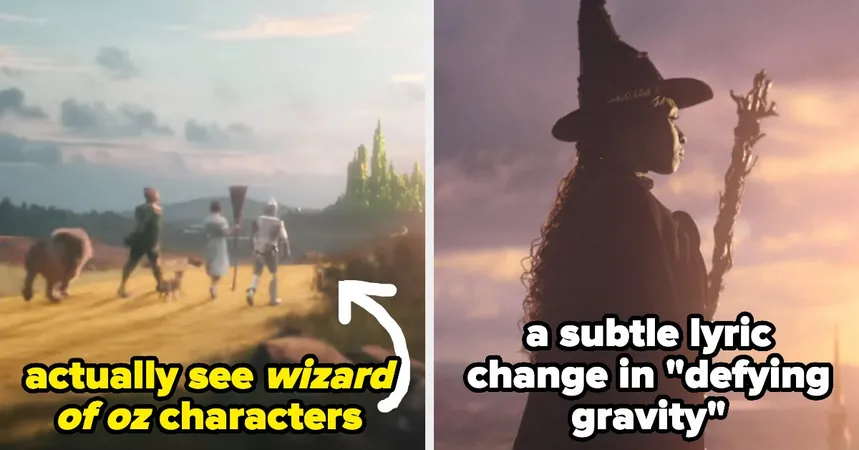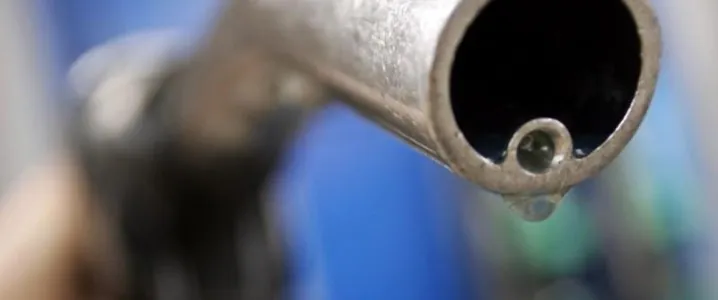
19 Key Differences Between the "Wicked" Movie Adaptation and the Broadway Stage Production That You Need to Know
2024-11-26
Author: Noah
Introduction
As excitement builds around the much-anticipated movie adaptation of *Wicked*, fans of the original Broadway musical are eager to see how their beloved story translates to the big screen. With star power from Cynthia Erivo as Elphaba and Ariana Grande as Glinda, and directed by the talented Jon M. Chu, the film aims to capture the magic of the stage production while introducing innovative elements that create a fresh experience.
19 Key Differences
But how does the film really compare to the Broadway version? Below are 19 intriguing differences between *Wicked: Part 1* and the stage musical that you may not have noticed:
1. A Familiar Introduction
The movie kicks off with a nostalgic nod to *The Wizard of Oz*, showing a brief glimpse of Dorothy and her companions trotting down the yellow brick road during the opening number, "No One Mourns the Wicked."
2. New Faces in Oz
Keala Settle takes on the role of Miss Coddle, a character who is exclusively part of the film, adding depth to Elphaba's educational journey.
3. Elphaba's Backstory
The film introduces Dulcibear, Elphaba's nanny, voicing the character with warmth and affection, an addition entirely absent from the stage production.
4. Gender-Swap Surprise
Bowan Yang steps into the role of Pfannee, Glinda’s friend, changing the character's gender from the original version in the musical.
5. Childhood Flashbacks
The movie offers a glimpse of Elphaba's childhood through flashbacks, providing context that the stage musical merely hints at during dialogue.
6. A Different Arrival at Shiz
In the film, Elphaba's arrival at Shiz University is altered; instead of starting on her first day, she’s only dropping off her sister, Nessarose, thereby creating a new storyline.
7. Fiyero's First Encounter
In a significant change, Elphaba encounters Fiyero in the woods, setting up a more dramatic first meeting than the shared introduction in the Broadway version.
8. Glinda's Family
The film depicts Glinda's parents dropping her off at school, a scene that the stage show only references indirectly.
9. Family Farewell
A poignant moment in the movie sees Elphaba's father come to say goodbye as she embarks for the Emerald City, whereas he is notably absent from the stage production after his initial appearance.
10. Classroom Dynamics
The song "Something Bad," performed by Dr. Dillamond, shifts from a classroom setting in the musical to an outdoor gathering in the film, highlighting the ongoing plight of talking animals in Oz.
11. Special Cameo
The movie features an exciting new section in the song "One Short Day," where original cast members Idina Menzel and Kristin Chenoweth appear as citizens of Oz, offering commentary on The Wizard’s rise to power.
12. The Wizard’s Vision
A spectacle of innovation, the film includes a scene where The Wizard demonstrates his "Oz of Tomorrow," showcasing a colorful and imaginative vision unique to the cinematic adaptation.
13. Magic with Poppies
Elphaba’s method of escape during Dillamond's class changes; while the stage production has her use her powers to create chaos, the film employs poppies to induce sleep among the students.
14. Ominous Odes
The film teems with references to *The Wizard of Oz*. For instance, it opens with children joyfully singing, "Ding Dong! The Witch Is Dead," bridging the two stories.
15. Scene Dynamics
Iconic songs are visually more narrative-driven in the movie; for example, "Defying Gravity" is extended into a nearly 14-minute sequence filled with character interaction and development.
16. Lyrical Tweaks
During "Defying Gravity," the guards' orders take a darker turn when they shout "Kill her," contrasting with the more ambiguous "Get her" from the stage production.
17. Nightlife in Oz
The Ozdust Ballroom's portrayal shifts from a student hangout to a hidden nightclub, adding a layer of mystique in the film.
18. Foreshadowing Character Bonds
In a move to enhance emotional ties, a heartfelt hug between Madame Morrible and Glinda is added post-"Defying Gravity," hinting at deeper plot developments.
19. A Heartbreaking Exit
The film concludes with a dramatic twist as Elphaba's father collapses during a pivotal scene, a visual not present in the stage adaptation, which simply alludes to his demise due to heartache.
Conclusion
As the *Wicked* movie adaptation dazzles audiences with its vibrant storytelling and new ideas, what do you think about these changes? Are you a die-hard fan of the Broadway musical, or are you excited to see how these cinematic elements evolve the classic tale? Let us know your thoughts and any differences you’ve spotted!









 Brasil (PT)
Brasil (PT)
 Canada (EN)
Canada (EN)
 Chile (ES)
Chile (ES)
 España (ES)
España (ES)
 France (FR)
France (FR)
 Hong Kong (EN)
Hong Kong (EN)
 Italia (IT)
Italia (IT)
 日本 (JA)
日本 (JA)
 Magyarország (HU)
Magyarország (HU)
 Norge (NO)
Norge (NO)
 Polska (PL)
Polska (PL)
 Schweiz (DE)
Schweiz (DE)
 Singapore (EN)
Singapore (EN)
 Sverige (SV)
Sverige (SV)
 Suomi (FI)
Suomi (FI)
 Türkiye (TR)
Türkiye (TR)